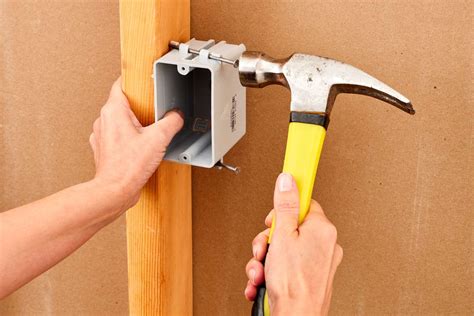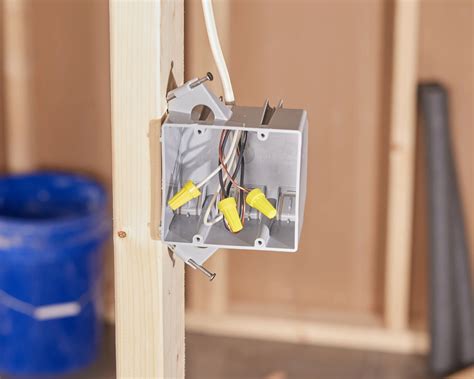do electrical boxes have to be mounted to studs It sounds like you have access to the stud since you have removed the old box and expanded the drywall. The box you picked happens to nail to a stud rather far back. But there are other options. What is a Junction Box? A junction box is simply a small enclosure for electrical connections. It protects these electrical connections from the environment around them and accidental contact. The box itself isn't anything specific. They are typically made of metal or plastic and are attached to a beam or possibly the drywall.
0 · putting electrical box existing drywall
1 · installing outlet box on stud
2 · installing electrical boxes on studs
3 · installing electrical box without stud
4 · electrical outlet boxes for drywall
5 · electrical box placement residential
6 · electrical box for existing drywall
7 · adding electrical box to existing
Bat box for an individual battery of this size is usually the safest technically since it minimizes toxic plumes of smoke with its filter. I'd say the step up from what you're using is either an ammo .
Junction boxes are not to have additional holes drilled into them for securing them to studs. The box you have shown can be used and mounted .

It sounds like you have access to the stud since you have removed the old box and expanded the drywall. The box you picked happens to nail to a stud rather far back. But there are other options. I want to surface mount a 1900 box in my garage to add outlets. There is no stud behind the area on the wall I want to mount the box. Is it permissible to secure the box using . Most electrical boxes are installed before the drywall during construction, so they are designed to be nailed or screwed straight across the box to the stud. When the drywall is already there, that simply doesn't work. You . Installing electrical boxes the depth of drywall while studs and joists are exposed is a handy and simple solution for homeowners. To do this on your own, buy switch and receptacle boxes that meet local codes and are .
Electrical boxes typically are mounted to the sides of studs for stability. Whether nailed to the studs or screwed in with adjustable brackets, boxes on studs tend to stay in place for a long time. But sometimes, it's not . If you’re installing an interior box, use screws or nails to attach the box to a stud, positioned so that the face of the box is flush with the drywall. Exterior boxes should be attached with screws; the back of the box should .
To successfully install electrical boxes on metal studs, keep these tips in mind: Use a level to make sure the boxes are level before securing them. If necessary, pre-drill holes in the metal studs to prevent splitting or deformation, . Best for: Walls that do not yet have drywall (open walls) A new work electrical box is installed in an open wall. The box is nailed or screwed to the side of the wall studs. It is secure and strong. If you have open walls (before .
Mounting an electrical box to metal studs requires self-drilling screws. This includes installing the electrical system inside of the metal framed wall. The electrical components may look similar, but electrical components designed .
Junction boxes are not to have additional holes drilled into them for securing them to studs. The box you have shown can be used and mounted fairly secure if you take the time to cut the opening as small as possible so the box tabs have more drywall to support it.It sounds like you have access to the stud since you have removed the old box and expanded the drywall. The box you picked happens to nail to a stud rather far back. But there are other options. I want to surface mount a 1900 box in my garage to add outlets. There is no stud behind the area on the wall I want to mount the box. Is it permissible to secure the box using drywall anchors? That would be preferable to opening up the wall to add blocking. My jurisdiction is on NEC 2017.
Most electrical boxes are installed before the drywall during construction, so they are designed to be nailed or screwed straight across the box to the stud. When the drywall is already there, that simply doesn't work. You do have several choices. Installing electrical boxes the depth of drywall while studs and joists are exposed is a handy and simple solution for homeowners. To do this on your own, buy switch and receptacle boxes that meet local codes and are large enough for the wires they hold. Electrical boxes typically are mounted to the sides of studs for stability. Whether nailed to the studs or screwed in with adjustable brackets, boxes on studs tend to stay in place for a long time. But sometimes, it's not always possible to find a suitable mounting point against the studs. What about between the studs? If you’re installing an interior box, use screws or nails to attach the box to a stud, positioned so that the face of the box is flush with the drywall. Exterior boxes should be attached with screws; the back of the box should have small holes for that purpose.
To successfully install electrical boxes on metal studs, keep these tips in mind: Use a level to make sure the boxes are level before securing them. If necessary, pre-drill holes in the metal studs to prevent splitting or deformation, especially for older or thinner stud materials. Best for: Walls that do not yet have drywall (open walls) A new work electrical box is installed in an open wall. The box is nailed or screwed to the side of the wall studs. It is secure and strong. If you have open walls (before installing drywall), use a new work box rather than installing an old work box after the drywall has been installed.Mounting an electrical box to metal studs requires self-drilling screws. This includes installing the electrical system inside of the metal framed wall. The electrical components may look similar, but electrical components designed for wood installation will not install in a metal framed wall. Junction boxes are not to have additional holes drilled into them for securing them to studs. The box you have shown can be used and mounted fairly secure if you take the time to cut the opening as small as possible so the box tabs have more drywall to support it.
It sounds like you have access to the stud since you have removed the old box and expanded the drywall. The box you picked happens to nail to a stud rather far back. But there are other options. I want to surface mount a 1900 box in my garage to add outlets. There is no stud behind the area on the wall I want to mount the box. Is it permissible to secure the box using drywall anchors? That would be preferable to opening up the wall to add blocking. My jurisdiction is on NEC 2017.
Most electrical boxes are installed before the drywall during construction, so they are designed to be nailed or screwed straight across the box to the stud. When the drywall is already there, that simply doesn't work. You do have several choices. Installing electrical boxes the depth of drywall while studs and joists are exposed is a handy and simple solution for homeowners. To do this on your own, buy switch and receptacle boxes that meet local codes and are large enough for the wires they hold. Electrical boxes typically are mounted to the sides of studs for stability. Whether nailed to the studs or screwed in with adjustable brackets, boxes on studs tend to stay in place for a long time. But sometimes, it's not always possible to find a suitable mounting point against the studs. What about between the studs? If you’re installing an interior box, use screws or nails to attach the box to a stud, positioned so that the face of the box is flush with the drywall. Exterior boxes should be attached with screws; the back of the box should have small holes for that purpose.

To successfully install electrical boxes on metal studs, keep these tips in mind: Use a level to make sure the boxes are level before securing them. If necessary, pre-drill holes in the metal studs to prevent splitting or deformation, especially for older or thinner stud materials.
putting electrical box existing drywall
Best for: Walls that do not yet have drywall (open walls) A new work electrical box is installed in an open wall. The box is nailed or screwed to the side of the wall studs. It is secure and strong. If you have open walls (before installing drywall), use a new work box rather than installing an old work box after the drywall has been installed.

cnc aluminum processing parts supplier

We carry different metals at our warehouse, including: carbon steel, aluminum, copper & brass bars. Carbon steel is ideal for almost any use. We carry structural sizes like angles, channels, beams and panels. Our carbon steel is available .
do electrical boxes have to be mounted to studs|installing electrical boxes on studs